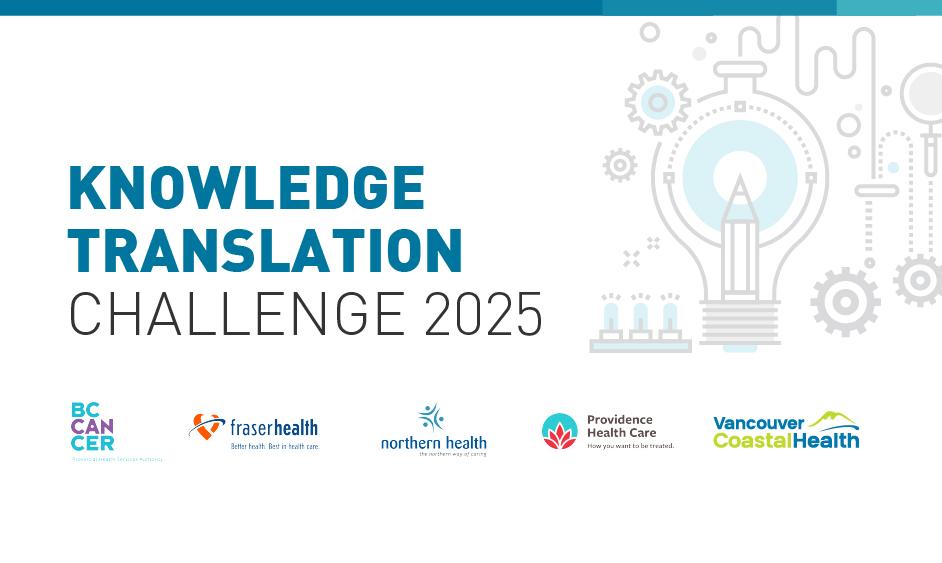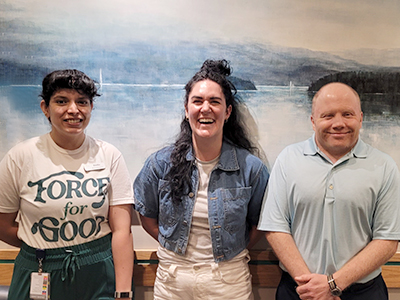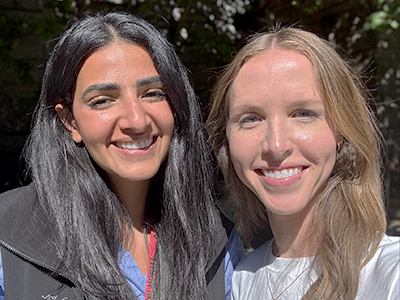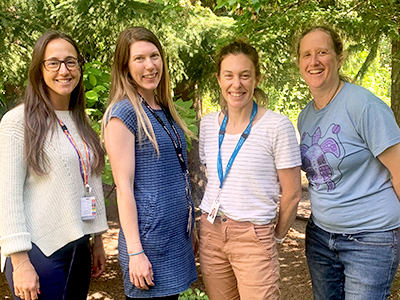
Congratulations to this year’s recipients of the Vancouver Coastal Health Research Institute Knowledge Translation Challenge Awards.
Knowledge translation is the art and science of moving evidence into health care policy and practice. Vancouver Coastal Health Research Institute (VCHRI) is proud to support health care professionals in effectively implementing evidence-based practice changes that improve patient care. The Knowledge Translation (KT) Challenge, a program delivered in collaboration with BC Cancer, Fraser Health, Northern Health and Providence Health Care, is grounded in capacity building and helps health care providers work with experienced investigators to share knowledge and build connections.
The team leads of the 2025 KT Challenge projects are:
- Danika Fonseca, physiotherapist, Vancouver General Hospital (VGH)
- Cindy Hoang, clinical counselling practice lead, Richmond Professional Practice
- Esther Huang, regional dietitian educator, VCH Clinical Education
- Shams Kadhim, clinical nurse educator, VGH Burns, Trauma and High Acuity Unit
- Farinah Kadir, substance use clinical resource nurse, VGH Psychiatric Inpatient Services
- Kaye Robinson, social work case manager, Whistler and Pemberton Mental Health and Substance Use Services
- Varinder Sidhu, licensed practical nurse educator, Long-term Care Professional Practice
Optimizing approaches to reduce complications after surgery

Project title: De-implementation of incentive spirometry on an acute surgical floor
Project team: Daryll Caves, Andrea Civitarese and Greg Noonan
Post-operative pneumonia is a common surgical complication that can lead to poor health outcomes, prolonged hospital stays and increased medical costs. At VGH, the current practice to reduce pneumonia risk involves providing patients with an incentive spirometer — a small device offering visual feedback for deep breathing. However, incentive spirometers are only effective when used correctly, which is not always the case in real-world settings.

“Evidence suggests that early mobilization and deep breathing exercises are as effective, or more so, than incentive spirometry in reducing post-surgical complications,” says Fonseca. “By switching to this new strategy, we see potential for improved patient outcomes and greater health care cost savings.”
Supporting clinical counselling outcomes through routine client feedback

Project title: The implementation of feedback-informed treatment (FIT) for routine progress and outcome monitoring for clinical counselling
Project team: Bahareh Bouzhmehrani and Zach Finley
There is growing evidence that using Feedback-Informed Treatment (FIT) enhances mental health outcomes for counselling clients, leading to higher engagement, treatment retention and improvement rates. FIT uses two validated, low-barrier tools, the Outcome Rating Scale and the Session Rating Scale, to foster client-centred dialogue and enable clinicians to adjust their approach in real time based on client feedback.
Despite its benefits, routine outcome monitoring is underutilized in clinical practice. This project proposes implementing FIT within VCH counselling programs. Clinical counsellors will participate in structured training sessions covering FIT’s theoretical foundations and practical applications. Paper-based tools will be embedded directly into session workflows for broad accessibility and ease of use.
“By facilitating transparent, client-led feedback processes, FIT empowers individuals to shape their care journey and fosters trauma-informed, culturally responsive practice,” says Hoang. “The implementation of FIT supports broader efforts toward sustainability, equity and client engagement as foundational elements of practice change.”
Empowering new dietitian graduates with enteral nutrition education

Project title: Just-in-time learning for new dietitian graduates, an enteral nutrition-focused learning curriculum
Project team: Meredith Cushing
Enteral nutrition (EN) — tube feeding for individuals unable to consume enough nutrients orally — is a basic competency for all clinical dietitians. However, many new graduate hires lack exposure to EN training during their practice education placements, requiring on-the-job training from existing clinicians.
To reduce this burden on front-line staff, this project team will develop a comprehensive EN curriculum for all new graduates, consisting of a self-directed online course to strengthen foundational EN knowledge, followed by in-person simulation training. This will provide a safe space for new graduates to build confidence and support their transition into independent practice.
“This just-in-time learning program aims to address knowledge gaps in EN practice, reducing the need for additional mentoring shifts from existing dietitians,” says Huang. “By the end of the curriculum, new grads should feel confident in their EN skills and be able to practice independently.”
Improving resuscitation practices with structured post-event debriefing

Project title: Vancouver General Hospital post-code blue hot debriefing project
Project team: Anne Lownie
Resuscitation events, also known as code blues, require rapid response, complex intervention and strong teamwork to stabilize patients at imminent risk of death. However, there is currently no formal process across VCH for conducting hot debriefs, which are brief, structured conversations immediately after such events.

“This project aims to promote sustainable hot debriefing within the Burn Trauma and High Acuity Unit, with potential to expand to other departments and health authorities,” says Kadhim. “By structuring this post-resuscitation practice, we hope to see improvements in patient care quality and survival outcomes.”
Using positive reinforcement for people with mental health and substance use disorders

Project title: Contingency management in acute psychiatry at VGH
Project team: Julia Reniers Smith, Emina Bajric and Heather Finnegan
VGH serves many individuals experiencing both mental health and substance use challenges. For people who use substances, the immediate effects of intoxication often reinforce continued use, even when long-term consequences are harmful. This makes it especially difficult to reduce or stop substance use without alternative sources of positive reinforcement.
Contingency management (CM) is an evidence-based approach that uses tangible rewards to encourage healthier behaviours such as attending groups and setting goals. This project will implement CM for individuals who use stimulants and are admitted to VGH’s acute inpatient psychiatric care, with success measured through staff engagement and patient-reported progress.
“Our focus is on embedding CM as a sustainable and impactful intervention within adult acute inpatient care,” says Kadir. “Results from our project will inform future programming and guide expansion of CM approaches beyond acute psychiatry settings.”
Facilitating knowledge sharing among rural care teams through roundtable sessions

Project title: Improving staff sustainability and service delivery through Interdisciplinary Team Rounds and Learning sessions, ‘Insight and Exchange Roundtables’, in a rural community-based mental health team
Project team: Sara Jennings, Taylor MacDougall, Annie Paquin, Alanna Ray and Cam Walter
The rural and remote Mental Health and Substance Use (MHSU) team supports municipalities and First Nations communities in the Sea-to-Sky region. This team’s unique geographic distance and limited co-location pose challenges for communication and collaboration, which can lead to staff isolation and impacts on quality of care.

“Insight and Exchange Roundtables can help mitigate challenges related to our team’s rural, multi-site setting by improving interdisciplinary communication and clinician confidence,” says Robinson. “We anticipate this practice change will enhance staff sustainability and service delivery for community-based MHSU treatment.”
Supporting long-term care residents in the management of nicotine withdrawal

Project title: Implementing nicotine replacement therapy decision support tool in long-term care
Project team: Monica Lee and Tenzin Yanki
Long-term care (LTC) homes across VCH strive to maintain smoke-free environments, but some residents remain nicotine dependent. Quitting without support can cause withdrawal symptoms like irritability, anxiety and sleep disturbances.
This project proposes implementing the Tobacco Use: Guideline for Supporting Residents in the Management of Nicotine Withdrawal across 17 VCH LTC homes. This evidence-based tool will be embedded into existing admission workflows, helping staff screen for tobacco use and guide them towards nicotine replacement therapy options like patches or gum.
“Integrating this guideline into regular workflows will standardize screening and increase awareness of nicotine replacement therapy options,” says Sidhu. “Ultimately, we aim to reduce smoking, minimize second-hand smoke exposure and promote a healthier LTC environment.”
KT Challenge Awards are made possible with the generous support of the BC Nurses Union, VGH School of Nursing Alumnae Association, Michael Smith Health Research BC and VGH & UBC Hospital Foundation via Robert HN Ho Enhancing Patient Care Fund, in partnership with VCHRI.


